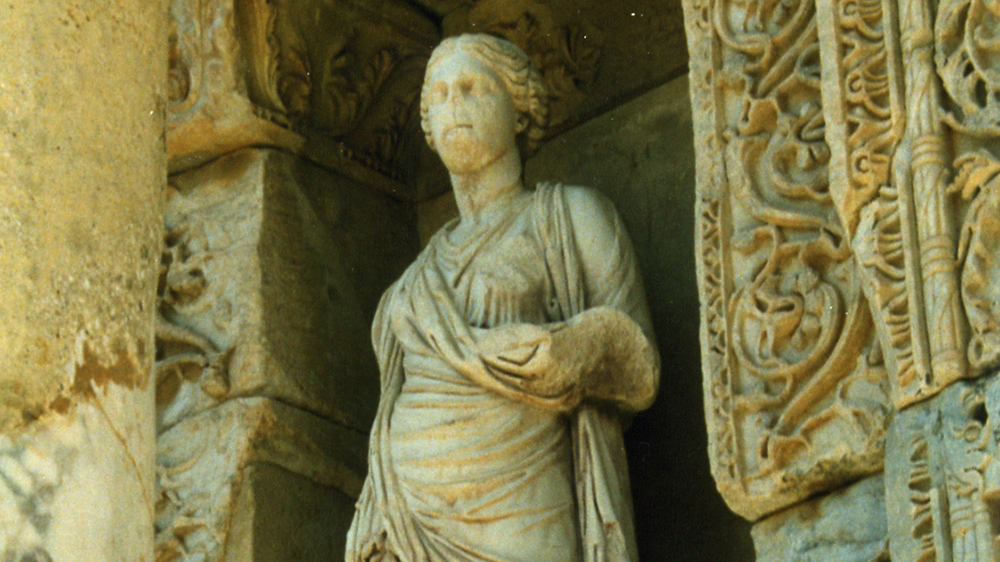Margaret Mowczko, a local scholar, has been thinking deeply about the Greek word authentein. It’s key to the long-running debate about whether women should be pastors or ministers, with its meaning at the centre of this discussion.
It occurs in just one verse in the Bible.
As the King James Version puts it, the Bible verse 1 Timothy 2:12 has Paul the author saying to Timothy, his protege, “But I suffer not a woman to teach, nor to usurp authority over the man, but to be in silence.”
In the NIV, “I do not permit a woman to teach or to assume authority over a man; she must be quiet.”
The part of the verse that translates authentein part of the verse is in italics.
Conservative interpreters, who assert that leading churches is a role for men, take what they see in this verse’s plain language to make their case. Paul, they argue, tells Timothy that running churches is for men. Women should not assume authority (authentein) and take over.
We should remember this informs the majority practice in Christianity – the Catholic and Orthodox churches establish this fact without working on where Protestants stand.
Mowczko disagrees, and while this word has been much debated on, a new comment of hers explores new ground – or newish ground because very little in this debate is totally new. But new enough to be reported on by Eternity.
Rather than talking about “authority” as a positive act, she argues that Paul, in using authentein, is talking about bad behaviour.
Mowczko argues that women behaved badly in Ephesus, where Timothy was urged to stay to look after a church and correct a wave of false teaching. The authentein the women are told not to do was bad behaviour. Still, Mowczko sets out to provide “three reasons why ‘to have authority over’ is an inadequate understanding of 1 Timothy 2:12.”
“The Greek word authentein (from the verb authenteō) is a relatively rare word in surviving documents, and I used to think its meaning was a bit of a mystery,” Mowczko writes. “But after looking long and hard at the meagre ancient evidence, I no longer hold this view. Instead, I believe there should be a consensus on the general sense, if not Paul’s precise meaning, of authentein.”
Rather than talking about “authority” as a positive act, she argues that Paul, in using authentein, is talking about bad behaviour. (This is a significant point where many conservative writers disagree – they say a positive and benign sort of authority is being discussed, simply something that women can’t have.)
The newish point she makes involves tracing how John Chrysostom (347-407), an important early church writer and Archbishop of Constantinople, used authentein.
“For example, in his tenth homily on Colossians, Chrysostom comments on Colossians 3:19 (a verse addressed to husbands) and says that a husband should not authentei his wife. This is translated into English as ‘act the despot’ in Volume 13 of The Nicene and Post Nicene Fathers of the Christian Church (First series). (Online source: New Advent).”
“… In his day, Chrysostom understood authenteō as referring to harsh, selfish, or ruling behaviour when the verb is used in the context of the actions of people, male and female, and he didn’t approve.”
Mowczko’s other points are not new, having been discussed many times, namely that in early translations of the verse, “authentein was understood by the translators as a negative behaviour, not as a healthy or beneficial kind of authority,” and that authentein can mean total power, such as God’s rule.
“I make every effort to see the validity of different interpretations of Bible verses through the eyes of Christians who hold to different views than mine,” Mowczko’ comments. “However, I have become reasonably convinced that Paul’s general sense of authentein in 1 Timothy 2:12 was self-centred, domineering behaviour.”
An alternative view on authentien by an evangelical scholar, Denny Burk of the Council for Biblical Manhood and Womanhood, is here. More conservative scholars such as Burk take the opposite view to Mowczko that authentien is about the good exercise of authority, not bad behaviour.
Margaret Mowczko blogs at margmowczko.com
Email This Story
Why not send this to a friend?


